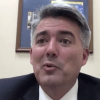A new study of COVID-19 vaccines for children is slated to start in Colorado by the first week of August.
Children ages 6 to 11 who want to be among the first in the U.S. with a shot at receiving the Moderna COVID-19 vaccine can participate in the clinical trial that is scheduled to begin on August 7. This is the vaccine currently approved for adults and children and teens ages 12-17.
“So far, vaccination for young children has been very limited. This study provides an opportunity for some of them to get vaccinated,” said Dr. Myron Levin, a pediatrician and a professor of pediatrics and infectious diseases at the University of Colorado School of Medicine.
Myron will be leading the Moderna study for children at the University of Colorado Anschutz Medical Campus in Aurora.
The study will move very quickly, with all study participants receiving either their first dose of the vaccine or placebo by the end of August. In this clinical trial, three out of four children will receive the vaccine, while one in four will get the placebo. In adults, half of the participants received vaccines, while the other half received the placebo. So, in the pediatric clinical trials, children who participate have a much better chance of getting the vaccine.

Moderna has been experimenting with reducing the doses that children receive compared to adults. So, it’s likely that some kids who participate in the clinical trial will receive lower doses than those ages 12 and older have received.
After monitoring how children ages 6 to 11 do with the Moderna vaccine, Levin and fellow researchers will then test the vaccine on kids ages 2 to 6, then later on babies and toddlers, ages 6-months to age 2.
Levin said the research is vital both to protect children from COVID-19 and to help communities defeat the deadly virus.
“Vaccines for children are part of our solution for trying to get out of the pandemic and getting back to normal,” said Levin,
Levin also led a pediatric clinical trial for the Novavax COVID-19 vaccines. And, he has conducted clinical trials for decades.
Determining the safety of the vaccines in children — and later making COVID-19 vaccines for children widely available if they are proven safe and effective — will make it much easier for younger kids to return to school and daycare as soon as possible, Levin said.
As soon as any COVID-19 vaccine gets approved for all children, study participants who received the placebo will immediately be able to get an approved vaccine.
“By the time they go to school, they’d get an active vaccine,” Levin said.
Parents who are interested in having their children participate in the clinical trials can leave a message at 720.777.4496.
As with all of the COVID-19 clinical trials, researchers are eager to include participants from diverse ethnic and racial backgrounds. Study participants receive some compensation. In the pediatric trials, the researchers minimize the number of times a child needs to have blood drawn since some kids are afraid of needles.
Levin is confident that the Moderna vaccine will be as safe in children, as it has been proven to be in adults.
“Great care is taken before new vaccines are given to children. They are being studied in successively younger populations,” Levin said. “The government and everyone who oversees clinical trials in people — including a board on campus — have to be convinced that the testing is in the best interests of people and that this research is worth doing.”
A rare complication for mRNA vaccines, including Moderna and Pfizer, has emerged in some adolescent boys. But, government regulators and experts at the Centers for Disease Control and Prevention (CDC) have determined that the dangers of suffering a severe case of COVID-19 are 100 times greater than the likelihood of suffering a serious side effect from these vaccines. CDC experts are continuing to recommend vaccines for everyone ages 12 and up.
“Relative to this complication, it’s by far better to be vaccinated,” Levin said.
Eventually, if COVID-19 vaccines are proven to be both safe and effective in children ages 6-months to 11, the vaccines will be vital in protecting children and their communities, Levin said.
“COVID-19 can be a serious disease for children and the people around them don’t want to get sick. Vaccines for children will make it easier to open daycare centers and children will be ready for school,” Levin said. “Everyone can get COVID-19 and we want everyone to be protected.
“Getting children vaccinated is also important for helping our country with herd immunity,” Levin said.
Boosting herd immunity is especially critical now since the Delta variant is highly infectious and is spreading fast in communities where fewer people are vaccinated.
“One way to avoid that is to have everyone vaccinated,” Levin said. “If some children are vaccinated and some are not, there will be the potential to spread COVID-19 in schools and among people who are not vaccinated.”
Editor’s Note: During the pandemic, the Colorado Times Recorder will occasionally post articles, like this one, from UCHealth Today, which is published by UCHeatlh, the hospital associated with the University of Colorado School of Medicine. Our goal is to provide as many people as possible with accurate information about the virus and related topics.




